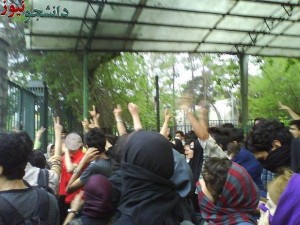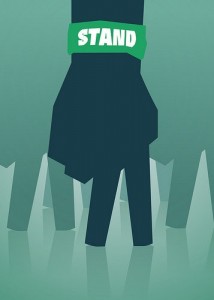
2115 GMT: Show of Support. Mir Hossein Mousavi and Zahra Rahnavard
have visited reformist leader Mostafa Tajzadeh as he continues to undergo medical treatment on his back.
Tajzadeh was supposed to return to prison last week to serve his six-year sentence, but this has been delayed because of his medical situation.
2010 GMT: MediaWatch. Last night we closed by noting how
The New York Times mangled the story of Iran's May Day, drawing from one "analyst" rather than any apparent recognition of events to claim --- erroneously --- that the Iranian people had not responded to opposition calls for public demonstrations.
It is only fair, therefore, that we give a tip of the hat to the
Los Angeles Times, which does notice the video clips that, despite regime efforts, got through
to show "opposition vitality".
NEW Iran Analysis: The Scattering of Protest is Still Protest
NEW Iran Eyewitness: “The Movement Is Still Strong and Vibrant”
UPDATED Iran Video and Translation: The Mousavi Statement for May Day/Teachers Day (29 April)
Latest Iran Video: Deterring Protests, “Greeting” Ahmadinejad (1 May)
Iran: US Filmmakers Demand “Free Jafar Panahi”
Iran Document: Mehdi Karroubi “The Green Movement is Growing in Society”
UPDATED Iran: Tehran, Defender of Rights (Don’t Mention Boobquake), Joins UN Commission on Status of Women
1520 GMT: Karroubi Watch. BBC Persian posts
a series of photographs, dated yesterday, that it says are from the memorial service for the father of the Minister of Culture, Mohammad Hosseini. They show Karroubi meeting Ali Larijani, 1st Vice President Mohammad Reza Rahimi, and Hossieni. Karroubi is being treated warmly, far from a leader of sedition, as he has been labelled by the "hardline" press.
1510 GMT: The UK Deportation Case. Actvists report that the deportation to Tehran of Bita Ghaedi, originally scheduled for 20 April but delayed because of the Icelandic volcanic ash,
has now been rescheduled for 5 May. Ghaedi, who fled Iran because of alleged domestic abuse, claims she will be under threat from Tehran authorities if she is forcibly returned.
1445 GMT: Rafsanjani Watch. Make of these comments what you will. In a meeting with members of the academic section of Parliament for National Teachers Day,
former President Hashemi Rafsanjani said:
When it comes to making laws and passing bills, the Parliament is in charge and the interference and meddling of other organizations can seriously damage the position and dignity of the Parliament....Actions that are either above the law or are against the law by any individual, any group or organization seriously damages the unity, solidarity and trust of the people.
1430 GMT: Political Prisoner Watch. Ali Akbar Soroush, university lecturer and member of the Islamic Iran Participation Front central council in Mazandaran province,
has been released on bail after 47 days of solitary confinement.
1200 GMT: Political Prisoner Watch. Lawyer Mohammad Oliyaifard, who has been prominent in his defence of those facing the death penalty,
has been arrested for propaganda against the regime.
1000 GMT: Teachers Day News.
Rah-e-Sabz, writing of students commemorating Teachers' Day while many of those teachers are behind bars,
reviews dismissals, detentions, and death sentences.
On a happier note, the website features Green students of Zahedan University
thanking and congratulating staff with flowers and cookies on May Day.
0940 GMT: The Effect of the Election. An interesting
radio roundtable with MPs Mohammad Reza Bahonar, Mohammad Reza Tabesh, and Mehdi Kuchakzadeh. As one might expect, the reformist Tabesh said "there is no balance" in Iranian politics and society when all protesters are imprisoned and all media are in the hand of a particular group. However, Bahonar --- far from a reformist --- asserted that the mistakes of the Guardian Council had a "negative effect" and spread doubt over the 2009 Presidential election.
0830 GMT: Parliament v. President. Key conservative MP Ahmad Tavakoli
has launched another assault on the Ahmadinejad economic development plan. Elyas Naderan, another conservative critic,
has repeated his allegation --- alluding to 1st Vice President Mohammad Reza Rahimi --- that "corrupt economic organisations linked to the government have been installed".
On the "outside", Rah-e-Sabz has
a long analysis alleging that the oil ministry in is the hands of an official, Ahmad Ghalebani, linked to Ahmadinejad Chief of Staff Esfandiar Rahim-Mashai. Ghalebani has allegedly excluded former Ministers (and Ahmadinejad opponents) like Gholam-Hossein Mohseni-Ejeie and Mohammad-Hossein Saffar-Harandi and appointed personnel with dubious financial records. The report, which is
echoed in Khabar Online, adds that both Ejeie and Naderan have complained about Ghalebani's corruption.
0755 GMT: Get Political, Revolutionary Guards. The Supreme Leader's liaison with the Islamic Revolution Guards Corps, Hojatoleslam Ali Saidi,
has denied that Imam Khomeini said the IRGC should not enter politics.
0750 GMT: A May Day Declaration. The reformist Mojahedin of Islamic Revolution's
May Day statement has demanded the unconditional release of all labour activists and unionists from prison.
0745 GMT: An Interesting Denial (and Un-Denial). Secretary of the Expediency Council and 2009 Presidential candidate Mohsen Rezaei
has used Khabar Online to deny a report in
Der Spiegel, "He knows that even his six bodyguards will be no protection if he sticks his neck out too far in Ahmadinejad's republic." Rezaei said, "Perhaps through making such allegations, some are trying to disrupt the peaceful climate and endanger cooperation, brotherhood of Iranian people."
Rezaei, however, said nothing about
this portion of the article: "Like [Mehdi] Karroubi, Rezaei refers to 'Dr. Ahmadinejad' and avoids using the word president. And like Karroubi the reformer, Rezai the conservative says: "It can't go on like this."
0740 GMT: The Oil Squeeze.
Tehran Times offers an optimistic counter to recent stories of countries limiting their imports of Iranian oil: exports from Tehran to Japan
rose 21 percent in March.
0720 GMT: Iran and Women's Rights. A twist in the tale of
Iran's successful attempt at membership on the UN Commission on the Status of Women, as
the Canadian Government issued a sharp criticism:
“It is the Government of Canada’s understanding that Iran was acclaimed as a member of the UN Commission on the Status of Women as part of an uncontested slate endorsed by the Asian regional group, of which Canada is not a member,” [Foreign Affairs Minister Lawrence Cannon] said. “We deplore this development but will use Iran’s membership on this body to take the Iranian authorities to task for their systemic human rights violations. We have done so in the United Nations General Assembly. We have done so in the United Nations Human Rights Council, and at every opportunity will continue to do so publicly.”
It will be interesting to see if the US, one of the countries who voted Iran on to the Commission by acclamation, takes any notice.
0710 GMT: Look Over There!
Yesterday we noted that Fars News was so busy covering international May Day protests that it forgot to notice them at home.
Step up, Press TV. Its feature story is "May Day Turns Violent in Berlin", but it does have
a bit of domestic coverage:
“We have documents that prove [Washington] is the root of world terrorism. It has been aiding and abetting extremist groups over the past years,” said President Ahmadinejad in a Saturday ceremony marking World Labor Day.
Curiously, however, the Press TV correspondent who noticed this ceremony missed the students who "greeted" the President. Indeed, the correspondent seems, in his/her haste to note the US and world terrorism on "World Labor DaY", all of Iran's workers.
0700 GMT: We begin today with two features: Scott Lucas offers
an analysis of the events of May Day, "The Scattering of Protest is Still Protest", and we have
an eyewitness account from an Iranian who recently returned to the country for a month, "The Movement is Still Strong and Vibrant".
On to National Teachers Day today to see if it brings further signs of protest despite the regime's dedicated attempt to put dissent beyond vision, if not to crush it altogether.
 Monday, May 3, 2010 at 7:39
Monday, May 3, 2010 at 7:39  The Arab League nations backed indirect talks between Israelis and Palestinians on Saturday. Arab League Secretary General Amr Moussa told reporters: "The timeframe of indirect talks will not change from what was agreed to in March, and there will be no change from indirect talks to direct talks until after the outcome of indirect talks has been assessed."
The Arab League nations backed indirect talks between Israelis and Palestinians on Saturday. Arab League Secretary General Amr Moussa told reporters: "The timeframe of indirect talks will not change from what was agreed to in March, and there will be no change from indirect talks to direct talks until after the outcome of indirect talks has been assessed."






